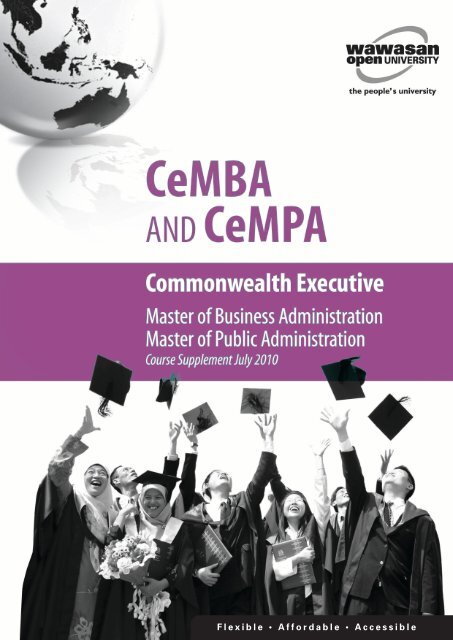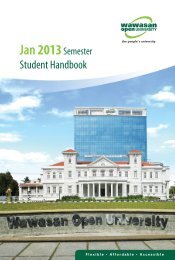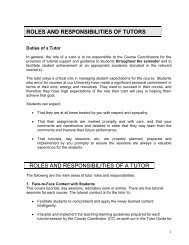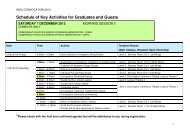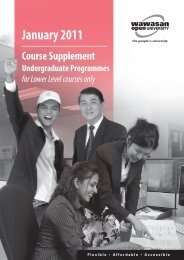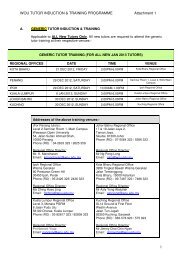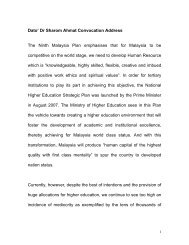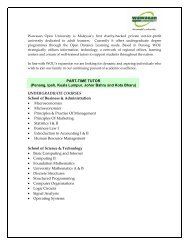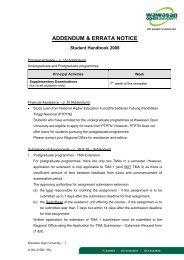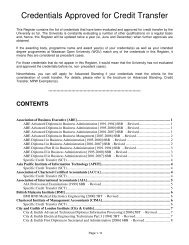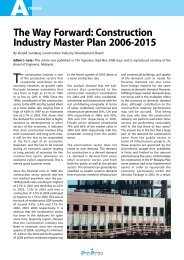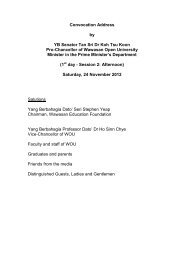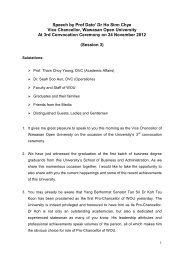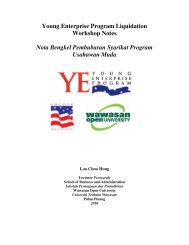For CeMBA and CeMPA students - Wawasan Open University
For CeMBA and CeMPA students - Wawasan Open University
For CeMBA and CeMPA students - Wawasan Open University
You also want an ePaper? Increase the reach of your titles
YUMPU automatically turns print PDFs into web optimized ePapers that Google loves.
This Course Supplement has been prepared to help you selectyour courses for the July 2010 semester. It is intended as asupplementary source of information <strong>and</strong> reference materialonly <strong>and</strong> is not a substitute for academic advice by an academiccounsellor. It provides a general course description <strong>and</strong> essentialinformation on the requirements of each course as well as advicethat may be useful to you in choosing your preferred courses. Newor prospective <strong>students</strong> are advised to read the Course Supplementcarefully in conjunction with the Prospectus before completingtheir application form.The <strong>University</strong> reserves the right to make any change deemednecessary <strong>and</strong> appropriate without notice. This Course Supplementdoes not constitute a binding obligation on the <strong>University</strong>.COURSE SELECTIONAll of the current postgraduate courses of the <strong>University</strong> areclassified into three categories, Core Compulsory courses, Electivecourses <strong>and</strong> Project course. To complete your postgraduate degreerequirements for the <strong>CeMBA</strong>/PA programmes, you are required tosuccessfully complete all 11 Core Compulsory courses, <strong>and</strong> any 3 outof the 6 Elective courses as well as a Project course. All the coursesin these programmes, except the Project course have the samecredit value, i.e., 3 credits. The Project course is a 6-credit course <strong>and</strong>you are expected to enrol for it towards the end of your programme.Before undertaking the Project course, you are required to havepassed at least 8 Core Compulsory courses <strong>and</strong> enrolled for BBM521/03 Research Methods course as well. The level of your course isindicated by the first digit in the course code. <strong>For</strong> all postgraduatecourses, the code given is 5XX/03. This indicates that it is a level 5(Postgraduate) course with 3 credits. The Project course, being acapstone course is given a course code of 601/06 to indicate that itis a higher level course with a value of 6 credits.We have also made available an e-version of the Course Supplementat your Student Portal (www.wou.edu.my).<strong>For</strong> selection of courses, you are strongly advised to adhere to theprogramme structure of your intended postgraduate programme.2 <strong>Wawasan</strong> <strong>Open</strong> <strong>University</strong> (700364 - W)
CONTENTSCommonwealth ExecutiveMaster of Business Administration (<strong>CeMBA</strong>)Master of Public Administration (<strong>CeMPA</strong>)<strong>CeMBA</strong> & <strong>CeMPA</strong>PageBAC 501/03 Accounting <strong>and</strong> Finance 4BBM 521/03 Research Methods 4BBM 501/03 Economic Environment of Business 5BIS 551/03 Electronic Commerce 5BMG 511/03 Managing Human Resources 6BMG 541/03 Disaster Management 6BMG 551/03 Project Management 7BMK 501/03 Marketing Management 7<strong>CeMBA</strong>BBM 601/06 Project 8<strong>CeMPA</strong>BPA 502/03 Public Policy 9BPA 503/03 Development Planning <strong>and</strong> Administration 9BPA 601/06 Project 10Course Supplement July 2010 3
<strong>For</strong> <strong>CeMBA</strong> <strong>and</strong> <strong>CeMPA</strong> <strong>students</strong>Course Code : BAC 501/03Course Title: Accounting <strong>and</strong> FinanceAdvisory Prerequisite(s) : NilLevel: HigherCredit hours : 3Duration of course: 1 semesterCourse Fee*: RM1080<strong>For</strong> <strong>CeMBA</strong> <strong>and</strong> <strong>CeMPA</strong> <strong>students</strong>Course Code : BBM 521/03Course Title: Research MethodsAdvisory Prerequisite(s) : NilLevel: HigherCredit hours : 3Duration of course: 1 semesterCourse Fee*: RM1080Course Coordinator<strong>For</strong> the latest name of Course Coordinator, please refer to the e-CourseSupplement in the Student Portal (www.wou.edu.my).This course is a core compulsory course in the <strong>CeMBA</strong>/PA programme. Themain objective of this course is to provide <strong>students</strong> with skills of accounting<strong>and</strong> financial information in managerial decision-making. This course isdesigned to acquaint <strong>students</strong> with the concepts <strong>and</strong> application of businessaccounting <strong>and</strong> financial management, as well as its inter-relationshipwith other business management functions. This is an application-basedcourse, using examples in the real business world to explain the usage of theaccounting <strong>and</strong> finance techniques.ObjectivesThe course is aimed at enabling <strong>students</strong> to:• explore the framework in which accounting resides.• provide an in-depth look at the preparation of financial statements,i.e. Balance Sheet, income Statement <strong>and</strong> Cash Flow Statement.• achieve an appreciation of how costing methods could be employedin managing business decisions.• provide a comprehensive coverage of key financial <strong>and</strong> investmentanalysis techniques.• provide a comprehensive coverage on the importance <strong>and</strong>mechanics of working capital management in the making of financialdecisions.Topics• Accounting Framework• Underst<strong>and</strong>ing Financial Statements• Cost Management• Financial <strong>and</strong> Investment Analysis• Financial DecisionsMain ReferenceAccounting <strong>and</strong> Finance, Commonwealth of Learning Executive MBA/MPA course material.Course Coordinator<strong>For</strong> the latest name of Course Coordinator, please refer to the e-CourseSupplement in the Student Portal (www.wou.edu.my).The course, Research Methods is organised into 5 units. The coursebegins with an introduction to research methodology which addressestopics relating to the meaning of research <strong>and</strong> its usefulness as well asexperimental designs. The second unit, data collection <strong>and</strong> measurement,deals with primary <strong>and</strong> secondary data collection, sampling, attitudemeasurement <strong>and</strong> scales. This is followed by data presentation <strong>and</strong> dataanalysis using nonparametric techniques. The fourth unit discusses thevarious multivariate techniques such as regression <strong>and</strong> factor analysis, <strong>and</strong>model building. Report writing <strong>and</strong> presentation are addressed in the finalunit.ObjectivesThe course is aimed at enabling <strong>students</strong> to:• provide <strong>students</strong> with basic underst<strong>and</strong>ing of business research.• equip <strong>students</strong> with sufficient information to appreciate howbusiness research is undertaken.• enable prospective researchers to consider the appropriateness ofresearch approach to their chosen field of study.Topics• Introduction to Research Methodology• Data Collection <strong>and</strong> Measurement• Data Presentation <strong>and</strong> Analysis• Multivariate Analysis <strong>and</strong> Model Building• Report Writing <strong>and</strong> PresentationMain ReferenceResearch Methods, Commonwealth of Learning Executive MBA/MPAcourse material.Other referencesZikmund, William (2008) Business Research Methods, Southern-Western:Cengage Learning.Zikmund, Babin & Carr, Griffin (2009) Business Research Methods,Southern-Western: Cengage Learning.* While the <strong>University</strong> will strive its best to maintain fee levels for as long as it can, it nevertheless reserves the right to adjust course fees from time to time with the approvalof the Ministry of Higher Education.4 <strong>Wawasan</strong> <strong>Open</strong> <strong>University</strong> (700364 - W)
<strong>For</strong> <strong>CeMBA</strong> <strong>and</strong> <strong>CeMPA</strong> <strong>students</strong>Course Code : BBM 501/03Course Title: Economic Environment of BusinessAdvisory Prerequisite(s) : NilLevel: HigherCredit hours : 3Duration of course: 1 semesterCourse Fee*: RM1080<strong>For</strong> <strong>CeMBA</strong> <strong>and</strong> <strong>CeMPA</strong> <strong>students</strong>Course Code : BIS 551/03Course Title: Electronic CommerceAdvisory Prerequisite(s) : NilLevel: HigherCredit hours : 3Duration of course: 1 semesterCourse Fee*: RM1080Course Coordinator<strong>For</strong> the latest name of Course Coordinator, please refer to the e-CourseSupplement in the Student Portal (www.wou.edu.my).This course addresses topics of how economic environment affectsbusiness decisions. Two branches of economics, Macroeconomics <strong>and</strong>Microeconomics are discussed in this course. Macroeconomics focuseson aggregate economic conditions <strong>and</strong> those conditions that set theenvironment within which a business operates. Topics covered underMacroeconomics are aggregate dem<strong>and</strong> <strong>and</strong> aggregate supply, inflation<strong>and</strong> unemployment, fiscal <strong>and</strong> monetary policies as well as the openeconomy. The microeconomics focuses on the economic forces thatinfluence the decisions made by individual consumers, firms, <strong>and</strong> industries.Topics covered under Microeconomics are market dem<strong>and</strong> <strong>and</strong> pricingdecision, cost of production <strong>and</strong> market structure.ObjectivesThe course is aimed at enabling <strong>students</strong> to:• summarize benefits of studying economic issues <strong>and</strong> describeinsights into society <strong>and</strong> international affairs resulted from thinkingin economic terms.• describe the overall market system.• distinguish between different types of elasticity.• explain the particular meaning of cost <strong>and</strong> profits in economics.• describe the various types of market structure.• account for the different approaches to measuring GDP.• state how shifts in aggregate dem<strong>and</strong> or supply can cause booms<strong>and</strong> recessions.• describe how fiscal policy influences the economy differently frommonetary policy.• outline the concept of the trade-off between inflation <strong>and</strong>unemployment.• elaborate on the reasons for which countries engage in internationaltrade.Topics• Introduction to Economic Environment <strong>and</strong> Underst<strong>and</strong>ing themarket Mechanism• Production, Cost, Profit <strong>and</strong> Market Structure• The Macroeconomy: Aggregate Dem<strong>and</strong> <strong>and</strong> Supply• Government Macroeconomic Policy• The <strong>Open</strong> EconomyMain ReferenceEconomic Environment of Business, Commonwealth of Learning ExecutiveMBA/MPA course material.Course Coordinator<strong>For</strong> the latest name of Course Coordinator, please refer to the e-CourseSupplement in the Student Portal (www.wou.edu.my).This course, available as an elective to both <strong>CeMBA</strong> <strong>and</strong> <strong>CeMPA</strong> <strong>students</strong>,provides an underst<strong>and</strong>ing of current <strong>and</strong> upcoming issues of managinge-commerce applications among business entities. The course introducesInformation Technology infrastructure, frameworks, business models <strong>and</strong>strategies to plan, build, leverage e-commerce for business operationaleffectiveness <strong>and</strong> competitiveness. The course also outlines marketingstrategies as well as legal <strong>and</strong> ethical issues in e-commerce applications.ObjectivesThe course is aimed at enabling <strong>students</strong> to:• identify <strong>and</strong> explain the main kinds of e-commerce operations.• describe <strong>and</strong> discuss the framework for e-commerce <strong>and</strong> its majorcomponents.• evaluate the impact of e-commerce on organisations.• explain the structure of the Internet <strong>and</strong> indicate the speed of itsdevelopment.• describe client/server applications <strong>and</strong> their usage on the Internet.• outline <strong>and</strong> discuss the major business values <strong>and</strong> deterrents of B2Ce-commerce.• describe <strong>and</strong> discuss the various business models for B2C <strong>and</strong> B2Be-commerce.• describe the features <strong>and</strong> identify the benefits of customerrelationship management.• evaluate the relevance of E-business models for businesstransformation.• discuss the strategic context for inter-organisational systems (IOS).• describe <strong>and</strong> apply some Internet marketing techniques <strong>and</strong> outlinean approach to developing effective marketing strategies.• discuss the impact of value chain management.Topics• Introduction to Electronic Commerce• Infrastructure for Electronic Commerce• Business Strategies for Electronic Commerce <strong>and</strong> Business Models• Introduction to Intranets <strong>and</strong> Extranets• Marketing Strategies, Ethical <strong>and</strong> Legal IssuesMain ReferenceElectronic Commerce, Commonwealth of Learning Executive MBA/MPAcourse material.Other referencesGary Schneider (2007) Electronic Commerce, 7th edn, Boston: ThomsonCourse Technology.David Whiteley (2007) E-Commerce: Strategy, Technologies <strong>and</strong>Applications, Singapore: McGraw-Hill.Jeffrey Rayport <strong>and</strong> Bernard Jaworski (2007) Introduction to E-Commerce,2nd edn, Boston: McGraw-Hill/Irwin.Kenneth Laudon <strong>and</strong> Carol Traver (2007) E-Commerce: Business,Technology, Society, 3rd edn, New Jersey: Pearson Prentice-Hall.Sid Huff, Scott Schneberger, Michael Wade, Peter Newson <strong>and</strong> MichaelParent (2002) Cases in Electronic Commerce, 2nd edn, Boston: McGraw-Hill.* While the <strong>University</strong> will strive its best to maintain fee levels for as long as it can, it nevertheless reserves the right to adjust course fees from time to time with the approvalof the Ministry of Higher Education.Course Supplement July 2010 5
<strong>For</strong> <strong>CeMBA</strong> <strong>and</strong> <strong>CeMPA</strong> <strong>students</strong>Course Code : BMG 511/03Course Title: Managing Human ResourcesAdvisory Prerequisite(s) : NilLevel: HigherCredit hours : 3Duration of course: 1 semesterCourse Fee*: RM1080<strong>For</strong> <strong>CeMBA</strong> <strong>and</strong> <strong>CeMPA</strong> <strong>students</strong>Course Code : BMG 541/03Course Title: Disaster ManagementAdvisory Prerequisite(s) : NilLevel: HigherCredit hours : 3Duration of course: 1 semesterCourse Fee*: RM1080Course Coordinator<strong>For</strong> the latest name of Course Coordinator, please refer to the e-CourseSupplement in the Student Portal (www.wou.edu.my).This course addresses topics of managing human resources as one of the keyelements in the coordination <strong>and</strong> management of work organisations. Thecourse outlines the various approaches to Human Resource Management<strong>and</strong> the evolution of the discipline to its present orientation. It covers aholistic content on human resource management practices, which includejob analysis, recruitment <strong>and</strong> placement, training <strong>and</strong> development,compensation <strong>and</strong> labour relations <strong>and</strong> employee security. At the end of thecourse, some emerging issues in regards to human resource management<strong>and</strong> various approaches to organisational development will be discussed.ObjectivesThe course is aimed at enabling <strong>students</strong> to:• review <strong>and</strong> evaluate the main models, frameworks <strong>and</strong> theories ofHuman Resource management (HRM).• discuss how HRM links with strategies adopted in institutions.• show what HR planning is <strong>and</strong> why effective enterprises perform it.• describe what are the roles of Job Analysis <strong>and</strong> various ways jobs canbe designed.• explain the process of acquiring human resources which includerecruitment, selection <strong>and</strong> orientation.• discuss what HR development means to an organization.• discuss the concepts of rewarding employees which includeperformance evaluation, compensation <strong>and</strong> job evaluation.• discuss the key issues in health <strong>and</strong> safety protection.• comments about the industrial <strong>and</strong> labour relations issues.• debate issues related to International Human Resource Management(IHRM).• discuss other emerging issues in HRM.Topics• Human Resource Management in Perspective• Meeting Human Resource Requirements• Developing Effectiveness in Human Resources• Implementing Compensation <strong>and</strong> Security• International HRM <strong>and</strong> Other Emerging Issues in HRMCourse Coordinator<strong>For</strong> the latest name of Course Coordinator, please refer to the e-CourseSupplement in the Student Portal (www.wou.edu.my).The goal of introducing this course in the MBA is to sensitise youngmanagers to the dem<strong>and</strong>ing <strong>and</strong> challenging task of building a disasterresilient <strong>and</strong> sustainable world. Among the topics covered in the course arethe complexities of natural <strong>and</strong> human-induced disasters, <strong>and</strong> the enormityof loss that can be caused by them, disaster mitigation <strong>and</strong> preparednessfor loss reduction, risk assessments <strong>and</strong> planning, institutional <strong>and</strong>legal mechanisms, post-disaster response <strong>and</strong> recovery <strong>and</strong> emergencymanagement.ObjectivesThe course is aimed at enabling <strong>students</strong> to:• provide the knowledge of the importance of post-disastermanagement.• introduce the principles <strong>and</strong> concepts of disaster management.• highlight the importance of environmental health issues in disastermanagement.• develop an environmental health emergency operations plan <strong>and</strong>disaster management plan.• explain the function of the UN agencies involved in the emergencyscenario.Topics• Overview of Disaster Management• Capacity Building <strong>and</strong> Training for a Disaster Resilient Society• Preparing for Emergency Response• Institutional Arrangements <strong>and</strong> Legal Frameworks for DisasterMitigation• Post Disaster Management <strong>and</strong> Business Continuity PlanningMain ReferenceDisaster Management, Commonwealth of Learning Executive MBA/MPAcourse material.Main ReferenceCOL Course Material by Lalith Weeratunga.Other referencesSnell, S Bohl<strong>and</strong>er, G (2007) Human Resource Management, InternationalEdition, Ohio: Thomson South-Western.Dessler, G (2005) Human Resource Management, 11th edn, InternationalEdition, New Jersey: Pearson Prentice Hall.Lim G S, Robert L Mathis, John H Hackson (2010) Human ResourceManagement – An Asia Edition, Singapore: Cengage Learning Asia Pte.Ltd.Mello, J A (2006) Strategic Human Resource Management, 2nd edn,International Edition, Ohio: Thomson South-Western.* While the <strong>University</strong> will strive its best to maintain fee levels for as long as it can, it nevertheless reserves the right to adjust course fees from time to time with the approvalof the Ministry of Higher Education.6 <strong>Wawasan</strong> <strong>Open</strong> <strong>University</strong> (700364 - W)
<strong>For</strong> <strong>CeMBA</strong> <strong>and</strong> <strong>CeMPA</strong> <strong>students</strong>CourseCode : BMG 551/03Course Title: Project ManagementAdvisory Prerequisite(s) : NilLevel: HigherCredit hours : 3Duration of course: 1 semesterCourse Fee*: RM1080<strong>For</strong> <strong>CeMBA</strong> <strong>and</strong> <strong>CeMPA</strong> <strong>students</strong>Course Code : BMK 501/03Course Title: Marketing ManagementAdvisory Prerequisite(s) : NilLevel: HigherCredit hours : 3Duration of course: 1 semesterCourse Fee*: RM1080Course Coordinator<strong>For</strong> the latest name of Course Coordinator, please refer to the e-CourseSupplement in the Student Portal (www.wou.edu.my).This course is available as an elective for all <strong>students</strong> wishing to completetheir <strong>CeMBA</strong>/PA programme. A project is a “one-off endeavour” such as theKLIA <strong>and</strong> the Penang Bridge, <strong>and</strong> introduces new products <strong>and</strong> services tothe market. This course covers the basic concepts of Project Managementsuch as the Process Model, Portfolio Management, Project Maturity <strong>and</strong>Business Integration Models. Project management tools such as PERT,Gantt charts, project activity network diagrams etc are included. Otherdisciplines are also covered; Cost <strong>and</strong> Quality Management, HumanResource Management, Risks Management, Procurement Management<strong>and</strong> Communications Management. These areas are covered in terms oftheir relation to Project Management.ObjectivesThe course is aimed at enabling <strong>students</strong> to:• provide an overview of Project Management.• provide learners with inputs on use <strong>and</strong> applications of projectmanagement tools; for example Work Breakdown Structure, Ganttcharts, <strong>and</strong> activity network diagrams.• familiarise learners with the concepts developed by quality gurus likeJuran, Cosby <strong>and</strong> Deming.• illustrate the application of the principles of cost management toenable the successful completion of projects within budget <strong>and</strong>without sacrificing quality.• provide the basic concepts of Human Resource managementfor effective deployment <strong>and</strong> utilization of manpower in projectmanagement.• sensitise the learners to the importance of information flow for themonitoring of project progress.• develop the learners’ competencies for risk identification <strong>and</strong>evaluation.• examine the material procurement process for project management.• illustrate the concept of portfolio management to balance limitedresources <strong>and</strong> maximise returns.• provide inputs on wrapping up the project upon completion.Topics• Introduction to Project Management <strong>and</strong> Project IntegrationManagement• Cost <strong>and</strong> Quality Management• Human Resource <strong>and</strong> Communications Management• Project Risk Management, Procurement Management <strong>and</strong> ProcessModel• Portfolio Management, Project Management Maturity <strong>and</strong> BusinessIntegration ModelsMain ReferencesProject Management, Commonwealth of Learning Executive MBA/MPAcourse material.Course Coordinator<strong>For</strong> the latest name of Course Coordinator, please refer to the e-CourseSupplement in the Student Portal (www.wou.edu.my).Marketing Management is organised into 5 units addressing topics ofmarketing management. The course begins with introducing marketing byfocusing on the principles of marketing, marketing in developing economy<strong>and</strong> marketing of services. Unit 2 covers planning <strong>and</strong> organisation whichcovers the topics of planning marketing mix, market segmentation,marketing organisation, <strong>and</strong> marketing research <strong>and</strong> its applications. Unit3 covers the topics of consumer behaviour <strong>and</strong> product management.Discussion on topics like product decisions <strong>and</strong> strategies, product life cycle<strong>and</strong> new product development, <strong>and</strong> br<strong>and</strong>ing <strong>and</strong> packing decisions willbe discussed here. Unit 4 focuses on pricing <strong>and</strong> promotion strategy. Topicslike pricing policies <strong>and</strong> practices, marketing communication, advertising<strong>and</strong> publicity, <strong>and</strong> personal selling <strong>and</strong> sales promotion are included inthis unit. The last unit - Unit 5 is about marketing distribution <strong>and</strong> publicpolicy. Topics like sales forecasting, distribution strategy, managing salespersonnel, <strong>and</strong> marketing <strong>and</strong> public policy will be discussed in this unit.ObjectivesThe course is aimed at enabling <strong>students</strong> to:• develop learners’ abilities to underst<strong>and</strong> the importance of planningmarketing mix.• enhance learners’ underst<strong>and</strong>ing of market segmentation.• familiarize learners with the concept of marketing organisation.• familiarize learners with marketing research <strong>and</strong> its applications.• acquaint learners with the models of consumer behaviour <strong>and</strong>determinants of consumer behaviour.• develop learners’ abilities in product management.• familiarize learners with pricing <strong>and</strong> promotion strategy in marketing.• familiarize learners with distribution <strong>and</strong> public policy.Topics• Introduction to Marketing <strong>and</strong> Marketing of Services• Marketing Planning <strong>and</strong> Organisation• Underst<strong>and</strong>ing Consumer <strong>and</strong> Product Management• Pricing <strong>and</strong> Promotions Decisions• Marketing Distribution <strong>and</strong> Public PolicyMain ReferenceMarketing Management, Commonwealth of Learning Executive MBA/MPA course material.Other referencesKotler, P, Keller, K, Ang, S H, Leong, S M <strong>and</strong> Tan, C T (2009) MarketingManagement: An Asian Perspective, 5th edn, Singapore: Pearson PrenticeHall.Winer, R (2006) Marketing Management, 3rd edn, New Jersey: PrenticeHall.Schwalbe, K (2006) Introduction to Project Management, 1st edn, Australia:Thomson Course Technology.Other referenceField, M <strong>and</strong> Keller, L (1998), Project Management, 1st edn, Boston: The<strong>Open</strong> <strong>University</strong>, Thomson Learning.* While the <strong>University</strong> will strive its best to maintain fee levels for as long as it can, it nevertheless reserves the right to adjust course fees from time to time with the approvalof the Ministry of Higher Education.Course Supplement July 2010 7
<strong>For</strong> <strong>CeMBA</strong> <strong>students</strong>Course Code : BBM 601/06Course Title: ProjectAdvisory Prerequisite(s) : Passed 8 Core courses <strong>and</strong> enrolled forBBM 521/03 Research MethodsLevel: HigherCredit hours : 6Duration of course: 1 semesterCourse Fee*: RM4320Course Coordinator<strong>For</strong> the latest name of Course Coordinator, please refer to the e-CourseSupplement in the Student Portal (www.wou.edu.my).The Project course is a capstone course of the CEMBA programme <strong>and</strong>comprises an independent study undertaken by you in respect of anorganizational or management issue. You can take up the Project Courseonce you have completed at least eight compulsory courses in yourrespective programme <strong>and</strong> have been enrolled for the course on ResearchMethods. As the project course carries 6 credits, a workload of 240 hoursis expected to be undertaken by you for this course. You are requiredto undertake the Project Course under the supervision of a supervisorapproved by the <strong>University</strong>.ObjectivesThe course is aimed at enabling <strong>students</strong> to:• apply management <strong>and</strong> business principles, theories, concepts,<strong>and</strong> techniques to underst<strong>and</strong> <strong>and</strong> solve or resolve organisational/managerial problems.• demonstrate soft managerial skills in the area of communication,analytical <strong>and</strong> critical thinking.Type of ProjectYour project may be from any one of the following types:• A comprehensive case study (covering problem formulation, analysis<strong>and</strong> recommendations in a single organization/multifunctionalarea).• A comparative study aimed at inter-organizational comparison/validation of theory/ survey of management or developmentalpractices.• A field study (a descriptive or an explanatory empirical study).You are encouraged to select the project topic in consultation with yourProject Supervisor.* While the <strong>University</strong> will strive its best to maintain fee levels for as long as it can, it nevertheless reserves the right to adjust course fees from time to time with the approvalof the Ministry of Higher Education.8 <strong>Wawasan</strong> <strong>Open</strong> <strong>University</strong> (700364 - W)
<strong>For</strong> <strong>CeMPA</strong> <strong>students</strong>Course Code : BPA 502/03Course Title: Public PolicyAdvisory Prerequisite(s) : NilLevel: HigherCredit hours : 3Duration of course:1 semesterCourse Fee*: RM720<strong>For</strong> <strong>CeMPA</strong> <strong>students</strong>Course Code : BPA 503/03Course Title: Development Planning <strong>and</strong> AdministrationAdvisory Prerequisite(s) : NilLevel: HigherCredit hours : 3Duration of course: 1 semesterCourse Fee*: RM720Course Coordinator<strong>For</strong> the latest name of Course Coordinator, please refer to the e-CourseSupplement in the Student Portal (www.wou.edu.my).This course draws on many disciplines of study. Besides looking at thedecisions that governments make for the nation or state, the course focuson who makes them, how they are made, the quality of the decisions<strong>and</strong> how they are carried out in practice. In this course student will needto explore underst<strong>and</strong>ing of public policy <strong>and</strong> how it is defined. Studentswill need to underst<strong>and</strong> that policy emerges from different contexts, <strong>and</strong>,that different institutions, groups <strong>and</strong> individuals influence policy-making.Policy can be conceptualised as a cyclical process. This cyclical model will beused throughout this course, although criticisms <strong>and</strong> other models will alsobe presented. Students will begin to consider some of the contemporaryissues that affect policy <strong>and</strong> examine some case studies that demonstratethese features of policy-making.ObjectivesThe course is aimed at enabling <strong>students</strong> to:• identify policy-making issues in practical case analyses.• list <strong>and</strong> explain the scope, objectives <strong>and</strong> importance of publicpolicy in modern times.• discuss the role of ministers <strong>and</strong> civil servants in the formulation ofpublic policy.• identify the role <strong>and</strong> relevance of policy-making networks <strong>and</strong>influence.• discuss <strong>and</strong> compare the various policy-making models.• identify some contemporary issues in policy-making.Topics• Policy Making: An Overview• Policy Making: Contextual Settings• Policy Making: Roles <strong>and</strong> Responsibilities• Policy Making: Networks <strong>and</strong> Influence• Policy Making: Policy Decision <strong>and</strong> Contemporary Issues.Main ReferencePublic Policy, Commonwealth of Learning Executive MBA/MPA coursematerial.Course Coordinator<strong>For</strong> the latest name of Course Coordinator, please refer to the e-CourseSupplement in the Student Portal (www.wou.edu.my).This course examines five major topics, namely, the concepts <strong>and</strong> contextof development administration, strategies <strong>and</strong> challenges of developmentplanning, participatory approaches for development planning <strong>and</strong>administration, <strong>and</strong> techniques for development. In order to highlightissues in specific developmental sectors, the planning of contemporarydevelopment issues in education, health, agriculture <strong>and</strong> industry in severaldeveloping countries have been emphasized. The course also deals withthe goals <strong>and</strong> targets in the coming years as well as the required strategiesfor moving towards effective development planning <strong>and</strong> administrationfor better performance on account of political, social, economic, <strong>and</strong>technological factors in these countries.ObjectivesThe course is aimed at enabling <strong>students</strong> to:• provide an overview of development planning <strong>and</strong> administration.• examine the meaning, nature, scope <strong>and</strong> significance of developmentadministration.• introduce the models of development administration from thecontext of political, economic <strong>and</strong> socio-cultural.• discuss the issue of poverty in South Asia <strong>and</strong> learn how the planningcould be made for sustaining development in South Asia.• examine development through multi-level planning.• discuss participatory approaches for development.• discuss the role of NGOs <strong>and</strong> local elected bodies in developmentplanning.• discuss the analysis of techniques like preparation of data matrix,trend analysis, sectoral <strong>and</strong> spatial planning, central settlements,central place theory, <strong>and</strong> scalogram analysis.Topics• Development Administration: Meaning, Nature, Scope <strong>and</strong>Significance• Development Planning: Concept <strong>and</strong> Rationale• Mixed Economy <strong>and</strong> Multilevel Planning: Contemporary Issues• Participatory Approaches: NGOs <strong>and</strong> the Bureaucracy• Tools of Analysis <strong>and</strong> the Road AheadMain ReferenceDevelopment Planning <strong>and</strong> Administration, Commonwealth of LearningExecutive MBA/MPA course material.* While the <strong>University</strong> will strive its best to maintain fee levels for as long as it can, it nevertheless reserves the right to adjust course fees from time to time with the approvalof the Ministry of Higher Education.Course Supplement July 2010 9
10 <strong>Wawasan</strong> <strong>Open</strong> <strong>University</strong> (700364 - W)
<strong>For</strong> <strong>CeMPA</strong> <strong>students</strong>Course Code : BPA 601/06Course Title: ProjectAdvisory Prerequisite(s) : Passed 8 Core courses <strong>and</strong> enrolled forBBM 521/03 Research MethodsLevel: HigherCredit hours : 6Duration of course: 1 semesterCourse Fee*: RM2880Course Coordinator<strong>For</strong> the latest name of Course Coordinator, please refer to the e-CourseSupplement in the Student Portal (www.wou.edu.my).The Project course is a capstone course of the CEMPA programme <strong>and</strong>comprises an independent study undertaken by you in respect of anorganizational or management issue. You can take up the Project Courseonce you have passed at least eight compulsory courses in your respectiveprogramme <strong>and</strong> have been enrolled for the course on Research Methods. Asthe project course carries 6 credits, a workload of 240 hours is expected to beundertaken by you for this course. You are required to undertake the ProjectCourse under the supervision of a supervisor approved by the <strong>University</strong>.ObjectivesThe course is aimed at enabling <strong>students</strong> to:• apply management <strong>and</strong> public policy principles, theories, concepts,<strong>and</strong> techniques to underst<strong>and</strong> <strong>and</strong> solve or resolve organisational/societal problems.• demonstrate soft managerial skills in the area of communication,analytical <strong>and</strong> critical thinking.Type of ProjectYour project may be from any one of the following types:• A comprehensive case study (covering problem formulation, analysis<strong>and</strong> recommendations in a single organization or policy area).• A comparative study aimed at inter-organizational comparison/validation of theory/ survey of management or developmentalpractices.• A field study (a descriptive or an explanatory empirical study).You are encouraged to select the project topic in consultation with yourproject supervisor.* While the <strong>University</strong> will strive its best to maintain fee levels for as long as it can, it nevertheless reserves the right to adjust course fees from time to time with the approvalof the Ministry of Higher Education.Course Supplement July 2010 11
Main Campus:<strong>Wawasan</strong> <strong>Open</strong> <strong>University</strong> (700364-W)54 Jalan Sultan Ahmad Shah, 10050 Penang, Malaysia.Fax: 04-226 9323 Email: enquiry@wou.edu.myRegional Offices:PenangWOU Regional Office7 China Street Ghaut10300 PenangTel: 04-263 3323/ 262 5359Fax: 04-262 3669Johor BahruWOU Regional Office17 & 19 Jalan Jaya 2Taman Jaya81300 Skudai, JohorTel : 07-556 4323 / 556 6323Fax : 07-554 9323IpohWOU Regional OfficeWisma Gerakan80 Persiaran Green Hill30450 Ipoh, PerakTel: 05-242 6323 / 243 6323Fax: 05-254 9323Kuala LumpurWOU Regional OfficeLevel 3 Menara PGRM8 Jalan Pudu Ulu56100 Cheras, Kuala LumpurTel : 03-9281 7323 / 9283 8323Fax : 03-9284 9323Email: ro_kl@wou.edu.myKota BharuWOU Regional Office3956 Tingkat BawahWisma GerakanJalan Temenggong15000 Kota Bharu, KelantanTel: 09-748 7323Fax: 09-748 9323KuchingWOU Regional OfficeSL14, Ground & First FloorWestin Avenue, Jalan Tun Jugah93350 Kuching, SarawakTel: 082-578 923/ 575 923Fax: 082-576 923Email: ro_kc@wou.edu.myKPT/JPS/DFT/US/PO1Petaling JayaWOU Regional Support OfficeL2-6 & 7 Wisma BU811 Lebuh B<strong>and</strong>ar UtamaB<strong>and</strong>ar Utama47800 Petaling Jaya, SelangorTel: 03-7629 7123 / 7629 7223Fax: 03-7629 7023(All Regional Offices are closed on Mondays, except Kota Bharu Regional Office which is closed on Sundays)<strong>For</strong> futher details, call WOU CARELINE 1-300-888-968(WOU) or visit wou.edu.my


